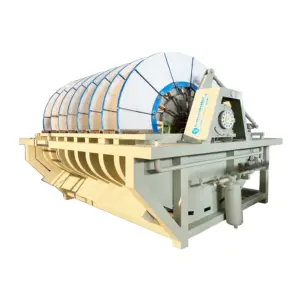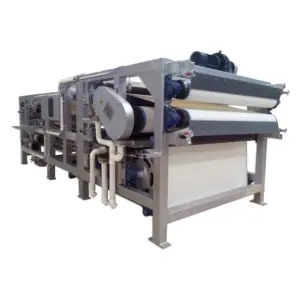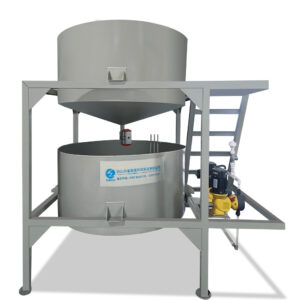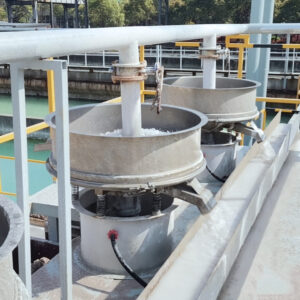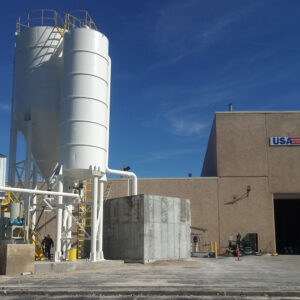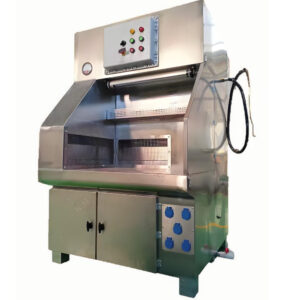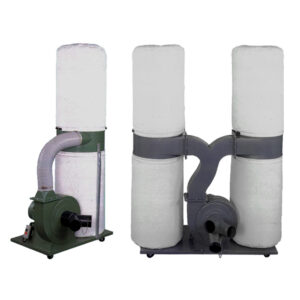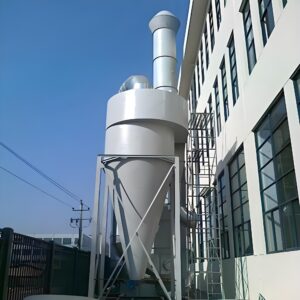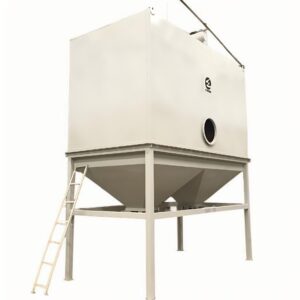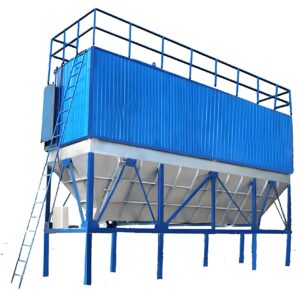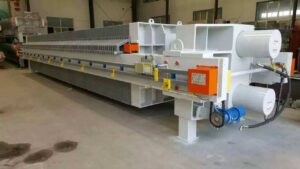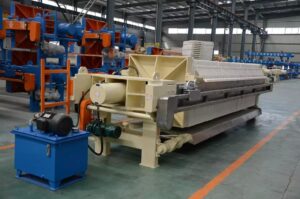Vacuum disk filters have revolutionized industrial filtration processes, offering a range of benefits that make them indispensable in various sectors. As we delve into the world of filtration technology, it's crucial to understand the significant advantages these systems bring to the table. From improved efficiency to cost-effectiveness, vacuum disk filters are transforming the way industries handle solid-liquid separation.
In this comprehensive exploration, we'll uncover the five key benefits that make vacuum disk filters stand out in the realm of industrial filtration. These advantages include enhanced filtration efficiency, continuous operation capabilities, reduced energy consumption, improved product quality, and versatility across multiple industries. Each of these benefits contributes to the growing popularity of vacuum disk filters and their pivotal role in modern industrial processes.
As we transition into the main content, it's important to note that the adoption of vacuum disk filters is not just a trend but a strategic move for businesses looking to optimize their operations. The advantages we'll discuss are backed by extensive research and real-world applications, demonstrating why these filters have become a preferred choice for many industry leaders.
Vacuum disk filters offer unparalleled efficiency and cost-effectiveness in solid-liquid separation processes, making them an essential component in various industrial applications.
How Do Vacuum Disk Filters Enhance Filtration Efficiency?
Vacuum disk filters are renowned for their ability to significantly boost filtration efficiency in industrial processes. The design of these filters allows for a continuous and highly effective separation of solids from liquids, resulting in cleaner filtrates and drier filter cakes.
At the core of their efficiency is the unique disk structure, which provides a large filtration area in a compact space. This design maximizes the contact between the slurry and the filter media, ensuring thorough separation.
The enhanced filtration efficiency of vacuum disk filters is particularly evident in their ability to handle high-volume throughputs while maintaining consistent quality. This is achieved through the precise control of vacuum pressure and disk rotation speed, which can be fine-tuned to suit specific process requirements.
Vacuum disk filters can achieve filtration efficiencies of up to 98%, significantly outperforming many traditional filtration methods.
| Parameter | Value |
|---|---|
| Filtration Efficiency | Up to 98% |
| Filtration Area | 1-100 m² |
| Disk Rotation Speed | 0.5-5 rpm |
The conclusion drawn from this efficiency enhancement is clear: vacuum disk filters offer a superior solution for industries requiring high-performance solid-liquid separation. Their ability to maintain high efficiency even under demanding conditions makes them an invaluable asset in modern filtration processes.
What Makes Vacuum Disk Filters Ideal for Continuous Operation?
One of the standout features of vacuum disk filters is their suitability for continuous operation. This characteristic is particularly valuable in industries where production must be maintained around the clock without interruptions for filter cleaning or maintenance.
The continuous operation capability of vacuum disk filters stems from their rotary design. As the disks rotate, different sections of the filter are continuously engaged in the filtration process, allowing for uninterrupted operation. This feature is especially beneficial in high-volume production environments where downtime can be costly.
Furthermore, the self-cleaning mechanism of vacuum disk filters contributes significantly to their continuous operation capabilities. As each section of the disk completes a rotation, the filtered solids are automatically discharged, preparing the filter media for the next cycle.
Vacuum disk filters can operate continuously for extended periods, with some models capable of running for weeks or even months without stopping for maintenance.
| Feature | Benefit |
|---|---|
| Rotary Design | Enables continuous filtration |
| Self-Cleaning Mechanism | Minimizes downtime |
| Automated Operation | Reduces manual intervention |
In conclusion, the continuous operation capability of vacuum disk filters makes them an ideal choice for industries that require uninterrupted production. This feature not only enhances productivity but also reduces labor costs associated with frequent filter maintenance and cleaning.
How Do Vacuum Disk Filters Contribute to Energy Efficiency?
Energy efficiency is a critical consideration in industrial processes, and vacuum disk filters excel in this area. These filters are designed to optimize energy usage while maintaining high performance, making them an environmentally friendly and cost-effective choice.
The energy efficiency of vacuum disk filters is primarily attributed to their low power consumption relative to their high filtration capacity. The vacuum system, which is the main energy consumer in these filters, is engineered to operate at optimal levels, ensuring that energy is not wasted.
Moreover, the ability to adjust operating parameters such as vacuum pressure and disk rotation speed allows for further energy optimization based on specific process requirements. This flexibility enables industries to fine-tune their filtration processes for maximum energy efficiency without compromising on performance.
Studies have shown that PORVOO vacuum disk filters can reduce energy consumption by up to 30% compared to conventional filtration systems, leading to significant cost savings and reduced environmental impact.
| Energy Saving Feature | Impact |
|---|---|
| Optimized Vacuum System | 15-20% energy reduction |
| Adjustable Parameters | Up to 10% additional savings |
| Efficient Motor Design | 5-10% improved efficiency |
In conclusion, the energy efficiency of vacuum disk filters not only contributes to cost savings but also aligns with global efforts towards sustainable industrial practices. This makes them an attractive option for companies looking to reduce their carbon footprint while maintaining high production standards.
What Impact Do Vacuum Disk Filters Have on Product Quality?
Product quality is paramount in any industrial process, and vacuum disk filters play a crucial role in ensuring high-quality outputs. These filters are designed to achieve superior solid-liquid separation, resulting in cleaner filtrates and drier filter cakes.
The impact on product quality is most evident in the consistency and purity of the filtered materials. Vacuum disk filters can handle a wide range of particle sizes and concentrations, ensuring that even fine particles are effectively removed from the liquid phase.
Furthermore, the ability to control filtration parameters with precision allows for customization of the filtration process to meet specific quality requirements. This level of control is particularly valuable in industries where product specifications are stringent, such as in pharmaceutical or food processing.
Vacuum disk filters can achieve filtrate clarity levels of up to 99.9%, ensuring that the final product meets or exceeds industry quality standards.
| Quality Parameter | Improvement |
|---|---|
| Filtrate Clarity | Up to 99.9% |
| Cake Moisture Content | Reduced by 10-20% |
| Particle Retention | Down to 1 micron |
In conclusion, the positive impact of vacuum disk filters on product quality is a significant factor driving their adoption across various industries. Their ability to consistently produce high-quality filtrates and filter cakes makes them an invaluable tool in maintaining product excellence and meeting regulatory standards.
How Versatile Are Vacuum Disk Filters Across Different Industries?
The versatility of vacuum disk filters is one of their most compelling advantages, making them suitable for a wide range of applications across diverse industries. From mining and minerals processing to wastewater treatment and chemical manufacturing, these filters have proven their adaptability and effectiveness.
In the mining industry, vacuum disk filters are used for dewatering mineral concentrates and tailings, improving resource recovery and waste management. In the chemical sector, they play a crucial role in separating valuable products from process streams, ensuring high purity and yield.
The food and beverage industry also benefits from vacuum disk filters, particularly in processes like starch recovery and juice clarification. Their ability to handle delicate materials without compromising product integrity is particularly valued in this sector.
Vacuum disk filters have been successfully implemented in over 20 different industries, demonstrating their exceptional versatility and adaptability to various filtration challenges.
| Industry | Application |
|---|---|
| Mining | Mineral concentrate dewatering |
| Chemical | Product separation and purification |
| Food & Beverage | Starch recovery, juice clarification |
| Pharmaceutical | API isolation, waste treatment |
In conclusion, the versatility of vacuum disk filters across different industries underscores their value as a universal solution for solid-liquid separation challenges. Their ability to adapt to various process requirements makes them a preferred choice for companies seeking flexible and efficient filtration solutions.
What Cost Benefits Do Vacuum Disk Filters Offer?
When it comes to industrial filtration, cost-effectiveness is a crucial factor, and vacuum disk filters excel in this area. These filters offer several cost benefits that make them an attractive option for businesses looking to optimize their filtration processes while managing expenses.
One of the primary cost benefits is the reduction in operational expenses. Vacuum disk filters are designed for continuous operation with minimal supervision, which translates to lower labor costs. Additionally, their energy efficiency, as discussed earlier, contributes significantly to reduced utility expenses over time.
The durability and longevity of vacuum disk filters also play a role in their cost-effectiveness. With proper maintenance, these filters can operate reliably for extended periods, reducing the frequency of replacements and associated downtime costs.
Implementing vacuum disk filter advantages can lead to a return on investment within 12-18 months, with ongoing cost savings in operational and maintenance expenses.
| Cost Factor | Savings Potential |
|---|---|
| Labor Costs | Up to 50% reduction |
| Energy Costs | 20-30% savings |
| Maintenance Costs | 15-25% lower |
In conclusion, the cost benefits offered by vacuum disk filters make them a wise investment for industries seeking to improve their bottom line. The combination of reduced operational costs, energy savings, and long-term reliability contributes to a favorable total cost of ownership, making these filters an economically sound choice for many businesses.
How Do Vacuum Disk Filters Contribute to Environmental Sustainability?
In an era where environmental sustainability is at the forefront of industrial concerns, vacuum disk filters emerge as a technology that aligns with eco-friendly practices. These filters contribute to environmental sustainability in several ways, making them an attractive option for companies committed to reducing their ecological footprint.
One of the primary environmental benefits of vacuum disk filters is their efficiency in solid-liquid separation. This efficiency results in reduced waste generation and improved resource recovery, which is particularly important in industries dealing with valuable materials or hazardous waste.
Moreover, the energy efficiency of vacuum disk filters, as discussed earlier, directly translates to reduced carbon emissions. By consuming less power while maintaining high performance, these filters help industries lower their overall energy consumption and associated environmental impact.
Vacuum disk filters can reduce wastewater volume by up to 70% in some applications, significantly decreasing the environmental burden of industrial processes.
| Environmental Aspect | Impact |
|---|---|
| Waste Reduction | Up to 70% |
| Energy Savings | 20-30% |
| Water Conservation | 40-60% improvement |
In conclusion, the contribution of vacuum disk filters to environmental sustainability is a compelling reason for their adoption in modern industrial processes. Their ability to reduce waste, conserve resources, and minimize energy consumption aligns perfectly with global efforts towards more sustainable industrial practices.
Conclusion
As we've explored throughout this article, vacuum disk filters offer a multitude of advantages that make them an indispensable technology in various industrial applications. From enhanced filtration efficiency and continuous operation capabilities to energy savings and improved product quality, these filters provide a comprehensive solution to many of the challenges faced in solid-liquid separation processes.
The versatility of vacuum disk filters across different industries underscores their universal appeal and adaptability. Whether in mining, chemical processing, food and beverage production, or wastewater treatment, these filters have proven their worth time and again.
Moreover, the cost benefits and contributions to environmental sustainability make vacuum disk filters not just a technological choice, but a strategic one for businesses looking to optimize their operations while adhering to increasingly stringent environmental regulations.
As industries continue to evolve and face new challenges, the role of efficient and effective filtration technologies becomes ever more critical. Vacuum disk filters, with their numerous advantages, are well-positioned to meet these challenges head-on, offering a reliable, efficient, and sustainable solution for solid-liquid separation needs.
In conclusion, the five key benefits of vacuum disk filters – enhanced efficiency, continuous operation, energy savings, improved product quality, and versatility – make them a cornerstone technology in modern industrial filtration. As we look to the future, it's clear that these filters will continue to play a vital role in shaping more efficient, cost-effective, and environmentally friendly industrial processes.
External Resources
- Disc Vacuum Filter Introduction – Comprehensive overview of disc vacuum filters, their working principles, and applications in various industries.
- Advantages and Disadvantages of Vacuum Filter – Detailed analysis of the pros and cons of vacuum filtration, including continuous operation benefits.
- CNBM Disc Filter – Information on disc filters used in papermaking, highlighting energy efficiency and water consumption advantages.
- Disc Vacuum Filter Working Principle – Explanation of disc vacuum filter operation, continuous production capabilities, and separation effects.
- Vacuum Filtration in Chemical Industry – Application of vacuum filtration in chemical processing, emphasizing efficiency and product quality improvements.
- Disc Filters for Mining Applications – Discussion on the use of disc filters in mining, focusing on dewatering and resource recovery.
